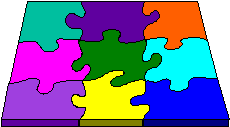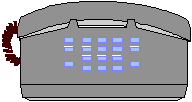|
Highland Child Protection Committee Child Protection Policy for Sports and Leisure Groups |
|
INTRODUCTION Children have the right to be protected from abuse and harm at all times and in all situations. These Guidelines and the attached Policy document have been designed to help your organisation protect these rights. Child Protection is the responsibility of every adult who has involvement with children. Highland Child Protection Committee would like to acknowledge the help and guidance of those on the working group that produced this document. Special thanks go to Highland Pre-school Services whose document inspired much of the content. Mr
A Riddell What is Child Protection? What can my Club do to ensure we give the kids a good service? The Children (Scotland) Act 1995 states that each child has the right to protection from all forms of abuse, neglect or exploitation. It also states that children should have the right to express their views on any issues or decisions affecting them. As a sports or leisure club, you offer a very valuable service to children. Through your club they learn about how to take part in the activities you offer. They also learn to trust and respect the adults involved. This places your volunteers in a unique position in that child’s life. There may come a time when a child feels the need to confide in the volunteer or when the volunteer feels that all is not well in the child’s life. Your club has a duty to ensure that volunteers are equipped with the necessary information and knowledge to give that child the support, guidance and help needed at the time. This policy has been produced to help you and your volunteers to think through the issues and develop your own child protection guidelines for your club. It will also help you to consider any training issues that you may have and point you in the right direction for help and advice in the future. Highland Child Protection Committee recommends the following principles of good practice in child protection for all groups: · Highland Child Protection Committee believes that all agencies working with vulnerable groups, particularly children, should have a child protection policy and statement for all volunteers and staff; · Highland Child Protection Committee believes that every child, regardless of age, has at all times, in all situations a right to feel safe and protected from any situation or practice which results in the child being physically or psychologically damaged; · Above all, we should all remember that the welfare of the child is of paramount consideration and we must all work together to ensure the protection of children.
The formal definition of Child Abuse is - ‘Children may be in need of protection where their basic needs are not being met, in a manner appropriate to their age and stage of development, and they will be at risk through avoidable acts of commission or *omission on the part of their parent(s), sibling(s) or other relative(s), or a carer (ie the person(s) while not a parent who has actual custody of the child).’ Reference ‘Protecting Children: A Shared Responsibility’. This is a very open definition which encourages us to be open minded and think about what child abuse is. For those working in the field of Child Protection the definition gets broken down further into Categories of Abuse, namely: Physical Injury Sexual Abuse Non-organic Failure to Thrive Emotional Abuse Physical
Neglect More
detailed descriptions of these categories are to be found in ‘Protecting
Children - A Shared Responsibility’. *NB
This means children at risk through either something a person has done to
them OR something a person is failing to do for them. How to react and listen Volunteers
and staff must, at all times: · Never trivialise or exaggerate child abuse issues; · Allow the child time to speak and not interrupt nor make suggestions to them which could imply making an investigation; · Reassure the child that they are glad she or he has told what has happened and that it was right to tell; · Not interrogate or question other than to clarify your understanding. If the matter is to be investigated further it will be so done by trained professionals. No matter how well you know the child, spare them having to repeat themselves over and over. Apart from anything else, the child may begin to think that you don’t believe them; · Be honest, tell the child that you cannot keep it a secret, you have to talk to someone else that can help; · Remain calm, no matter how difficult it is to listen to the child - think of how hard it must be to say it. Some things are very difficult to talk about, you’ve been chosen because the child feels they can talk to you. If you show anger, disgust, disbelief then the child may stop talking for fear of upsetting you further or feel that your negative feelings are being directed towards them; · Listen to the child - REALLY LISTEN - take what they say seriously. Tell them that they’ve done the right thing by telling you; ·
As
soon as practical write down everything the child told you, but remember
that this is a confidential matter between you and the child.
The only people you should be discussing it with is your
organisation’s Designated Officer and the investigating team. As a Designated Officer for your group you are responsible for ensuring that your policy is up to date, that it is clearly displayed (if possible), that the volunteers and staff are aware of the policy, have read and understood it. You must make sure that you are up to date with the current Inter-agency Guidelines issued by the Child Protection Committee, if you don’t have a copy contact the Development Officer (Child Protection) for one. Make sure you know who your Designated Officer (Social Work) is. Have to hand the following telephone numbers - · Police · Area Social Work Office Do not be afraid to make contact with these people for advice and guidance - remember - you may not be the only one to have concerns. You must also remember that all referrals are discussed thoroughly by the statutory agencies prior to any action being taken. Your concerns will be genuine and treated as such by them. Highland Child Protection Committee recommends the following policy statement
Every group should: · Hold a register of every child involved with the club and have a contact name and number close to hand in case of emergencies; · Treat everyone with respect; · Remember that some issues are confidential; · Provide an example you would wish others to follow; · Where possible consider activities which involve more than one adult being present or at least within sight and hearing of others; · Remember, someone else might misinterpret your actions even if they are well-intentioned; · Respect a child’s right to personal privacy; · Provide time for children to talk to you; · Encourage children to respect and care for others; · Take action to stop any inappropriate verbal or physical behaviour; · Have a group policy for the collection of children after meetings have finished; · Remember to REFER not INVESTIGATE any suspicions or allegations about abuse; ·
Only
share concerns and seek support from those identified in the group’s
child protection policy. Child Protection Policy for___________________
……………………….. ……………………..recognises that child protection should not be treated in isolation - we will take on board guidance given by Highland Child Protection Committee and will address recruitment and selection of volunteers and paid employees by doing the following: 1) We accept that it is our responsibility as a group to check that all adults with regular access to children have been appropriately vetted. 2) We will make a request for previous addresses on job application forms; 3) We will ask for the names of two referees who will be prepared to provide a written reference, and who may be interviewed personally; 4) We will interview prospective volunteers and staff; 5) We will note at interview all previous relevant experience of volunteers and staff; 6) We
will carry out a probationary period for all volunteers and staff of at
least 1) Upon the receipt of any information from a child or suspicions, it is necessary to record what they have seen, heard or know accurately at the time the event occurs; 2) Share their concerns with the Designated Officer for the group and agree action to take; 3) Never investigate.
If you have concerns you must act - it may be the final piece of the jigsaw that is needed to protect that child - or you may prevent further children from being hurt. Both your local Area Social Work Office and Police Office telephone numbers are to be found in the telephone directory. For ease of reference note them below - Area Social Work Office…………………………………. Police Station……………………………………………… Named Contacts _ Area Social Work Office …………………………………
Police Station………………………………………………
Out
of hours Social Work Emergency Service - 0345 697284 1) Scottish Office (1998) Protecting Children: A Shared Responsibility Edinburgh: HMSO 2) Volunteer Development Scotland (1995) Protecting Children: A Code of Good Practice for Voluntary Organisations in Scotland working with children and young people Stirling: Volunteer Development Scotland 3) Children (Scotland) Act 1995
FOR FURTHER
INFORMATION CONTACT Susan Maclaren Development Officer (Child Protection) Highland Child Protection Committee Kinmylies Building Leachkin Road INVERNESS IV3 8NN Telephone 01463 703483 |



